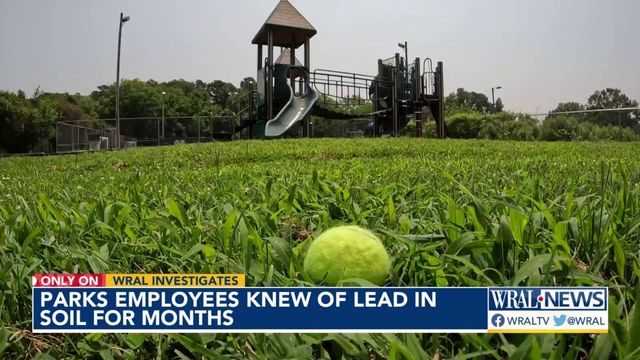WRAL Investigates: Durham Parks Department employees knew of lead in parks, did not elevate issue
Internal city emails obtained by WRAL Investigates through a records request show that at least two high-ranking Durham Parks and Recreation Department employees knew, for months, that Duke researchers found lead in the soil at three local parks, yet seemingly did not elevate the issue.
In a Nov. 30, 2022, email from Duke University Professor Dan Richter to Parks Superintendent Robert Jennings and DPR's Assistant Director of Planning and Development Thomas Dawson, Richter informed them he and graduate student Enikoe Bihari found "very high soil lead in all three parks" they tested - East Durham, East End and Walltown, which were previously incinerator sites.
Jennings' response to Richter on Dec. 5, 2022, indicates DPR may have known for much longer that lead was in the soil at those locations.
"The findings from your research are consistent with findings going back to the Phase 1 environmental studies," he wrote. "DPR would plan remediation efforts based on several factors including available funding, and/or development at particular site, especially development that would impact the public."
In December 2022, the Duke researchers' findings were published in Bihari's master's thesis.
In a subsequent email in May 2023, Richter continued to try to push the City to take action, writing "I do worry about what we've found and am trying my best to help galvanize the city to pay attention to the soils problems."
By June, a Durham community member stumbled upon the thesis online, prompting a June 1 email from the Walltown Community Association to city leaders, including City Manager Wanda Page and Mayor Elaine O'Neal. It informed them of the research and proposed a plan of action.
Responses from O'Neal and Page indicate they were not aware of the study's findings until that point.
In a June 5 email from Parks Department Director Wade Walcutt to the Dean of Duke's Nicholas School of the Environment, Toddi Steelman, Walcutt asked that Duke not provide information to residents without clearing it with the city first.
"We respectfully request prior to anymore [sic] communication from you and / or your team with the public on your findings," Walcutt said. "We’d like an opportunity to discuss this matter with you further and review your findings. Our request is to ensure we are all on one accord."
Steelman declined that request, writing back "We feel an obligation to connect with the community given the concerns they have raised and the need to honor the commitments we have now made to them."
The emails also show that some are questioning the findings of the Duke researchers. On June 9, the City's Risk Manager Heather Galeotti wrote to Deputy City Manager Bertha Johnson and CFO Tim Flora that, after speaking with a professional in the field, the methodology used was not the industry standard.
“He acknowledges that further testing will likely result in some areas with higher than acceptable levels of lead … but he would be surprised if the confirmation testing results mirror the Duke study," Galeotti wrote.
WRAL Investigates reached out to a spokesperson for the Durham Parks and Recreation Department to ask why its employees did not elevate the Duke researchers' findings once they were aware of them. In response, WRAL Investigates received a statement that did not directly answer the question:
"The City of Durham is aware of past email correspondence between Duke soil scientist Dan Richter and Durham Parks and Recreation (DPR) staff about the research and preliminary findings of a student report raising concerns about varying levels of lead found and/or suspected in the soil in some areas of five DPR parks. While the email discussion suggests action be taken to test the soil, the actual report with specific findings was not received by DPR until May 24 ... We pledge to be transparent, sharing information when the testing is complete and an action plan, if needed."
The city hired Mid-Atlantic Associates to test the soil in the three Durham parks in which the Duke research identified lead, and two more parks, Northgate and Lyon, in which the researchers suspected it. The city expects the company's testing to be completed by the end of July, and pledges to share the results in a public meeting.












